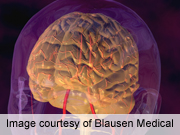
MONDAY, Dec. 2, 2013 (HealthDay News) — A newer MRI method can detect low iron levels in the brains of children with attention-deficit/hyperactivity disorder (ADHD).
The method could help doctors and parents make better informed decisions about medication, a new study says.
Psychostimulant drugs used to treat ADHD affect levels of the brain chemical dopamine. Because iron is required to process dopamine, using MRI to assess iron levels in the brain may provide a noninvasive, indirect measure of the chemical, explained study author Vitria Adisetiyo, a postdoctoral research fellow at the Medical University of South Carolina.
If these findings are confirmed in larger studies, this technique might help improve ADHD diagnosis and treatment, according to Adisetiyo.
The method might allow researchers to measure dopamine levels without injecting the patient with a substance that enhances imaging, she said.
ADHD symptoms include hyperactivity and difficulty staying focused, paying attention and controlling behavior. The American Psychiatric Association reports that ADHD affects 3 percent to 7 percent of school-age children.
The findings were scheduled for presentation Monday at the annual meeting of the Radiological Society of North America in Chicago.
The researchers used an MRI technique called magnetic field correlation imaging to measure iron levels in the brains of 22 children and teens with ADHD and another group of 27 children and teens without the disorder (the “control” group).
The scans revealed that the 12 ADHD patients who’d never been treated with psychostimulant drugs such as Ritalin had lower brain iron levels than those who’d received the drugs and those in the control group.
The lower iron levels in the ADHD patients who’d never taken stimulant drugs appeared to normalize after they took the medicines.
No significant differences in patients’ brain iron levels were detected through blood tests or a more conventional method of measuring brain iron called MRI relaxation rates, the study authors noted.
Data and conclusions presented at meetings are typically considered preliminary until published in a peer-reviewed medical journal.
More information
The U.S. National Institute of Mental Health has more about ADHD.
Copyright © 2026 HealthDay. All rights reserved.

